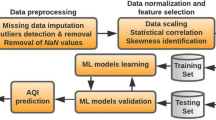Abstract
ANFIS is an artificial intelligence technique which is composed of a combination of artificial neural networks and fuzzy inference system. Due to its structure, it is used in modeling and identifying numerous systems in various fields. The training process of ANFIS is important to obtain effective results with it. So, a successful training algorithm should be used. In this study, the ANFIS is trained by using ABC algorithm for the solution of the real-world problem. For this purpose, the number of foreign visitors coming to Turkey from the USA, Germany, Bulgaria, France, Georgia, the Netherlands, England, Iran and Russia is estimated. In addition, total number of visitors coming to Turkey is also predicted. In applications, 150 months of data between July 2002 and December 2014 are utilized and a time series is created using these data. The results obtained using ABC algorithm are compared with GA, DE, HS and PSO. As a conclusion, it is seen that the results obtained using ABC algorithm for estimation of number of foreign visitors are more successful than other optimization methods.













Similar content being viewed by others
References
Akay B, Karaboga D (2015) A survey on the applications of artificial bee colony in signal, image, and video processing. SIViP 9(4):967–990
Alagarsamy SB, Kondappan S (2018) Ear recognition system using adaptive approach Runge–Kutta (AARK) threshold segmentation with ANFIS classification. Neural Comput Appl. https://doi.org/10.1007/s00521-018-3805-6
Amin F, Fahmi A, Abdullah S (2018) Dealer using a new trapezoidal cubic hesitant fuzzy TOPSIS method and application to group decision-making program. Soft Comput 23(14):5353–5366
Bayram D, Şeker S (2015) Anfis model for vibration signals based on aging process in electric motors. Soft Comput 19(4):1107–1114
Chen MS, Ying LC, Pan MC (2010) Forecasting tourist arrivals by using the adaptive network-based fuzzy inference system. Expert Syst Appl 37(2):1185–1191. https://doi.org/10.1016/j.eswa.2009.06.032
Fahmi A, Abdullah S, Amin F, Siddiqui N, Ali A (2017) Aggregation operators on triangular cubic fuzzy numbers and its application to multi-criteria decision making problems. J Intell Fuzzy Syst 33(6):3323–3337
Fahmi A, Abdullah S, Amin F, Khan MSA (2019) Trapezoidal cubic fuzzy number Einstein hybrid weighted averaging operators and its application to decision making. Soft Comput 23(14):5753–5783
George A, Ioana UC (2007) Forecasting tourism demand using ANFIS for assuaring successful strategies in the view of sustainable development in the tourism sector. In: Proceedings of the 2nd IASME/WSEAS international conference on energy and environment, 2007. World Scientific and Engineering Academy and Society (WSEAS), pp 212–217
Gopaul A, Cheeneebash J (2015) A comparison of the ANFIS model with SARIMA for the forecasting of inbound tourism demand for mauritius. Univ Maurit Res J 21
Harandizadeh H, Toufigh MM, Toufigh V (2018) Application of improved ANFIS approaches to estimate bearing capacity of piles. Soft Comput 23:1–13. https://doi.org/10.1007/s00500-018-3517-y
Ho WH, Chen JX, Lee IN, Su HC (2011) An ANFIS-based model for predicting adequacy of vancomycin regimen using improved genetic algorithm. Expert Syst Appl 38(10):13050–13056. https://doi.org/10.1016/j.eswa.2011.04.109
Jang JSR (1993) ANFIS: adaptive-network-based fuzzy inference system. IEEE Trans Syst Man Cybern 23(3):665–685. https://doi.org/10.1109/21.256541
Kar S, Das S, Ghosh PK (2014) Applications of neuro fuzzy systems: a brief review and future outline. Appl Soft Comput 15:243–259
Karaboga D (2005) An idea based on honey bee swarm for numerical optimization. Technical report-tr06, Erciyes University, Engineering Faculty, Computer Engineering Department
Karaboga D (2010) Artificial bee colony algorithm. Scholarpedia 5(3):6915
Karaboga D, Aslan S (2019) Discovery of conserved regions in DNA sequences by artificial bee colony (ABC) algorithm based methods. Nat Comput 18(2):333–350
Karaboga D, Basturk B (2007) A powerful and efficient algorithm for numerical function optimization: artificial bee colony (ABC) algorithm. J Global Optim 39(3):459–471
Karaboga D, Kaya E (2013) Training ANFIS using artificial bee colony algorithm. In: 2013 IEEE international symposium on innovations in intelligent systems and applications, IEEE INISTA 2013. https://doi.org/10.1109/inista.2013.6577625
Karaboga D, Kaya E (2014) Training ANFIS using artificial bee colony algorithm for nonlinear dynamic systems identification. In: 2014 22nd signal processing and communications applications conference, SIU 2014—proceedings, 2014, pp 493–496. https://doi.org/10.1109/siu.2014.6830273
Karaboga D, Kaya E (2017) Training ANFIS by using the artificial bee colony algorithm. Turk J Electr Eng Comput Sci 25(3):1669–1679
Karaboga D, Gorkemli B, Ozturk C, Karaboga N (2014) A comprehensive survey: artificial bee colony (ABC) algorithm and applications. Artif Intell Rev 42(1):21–57
Khazraee S, Jahanmiri A, Ghorayshi S (2011) Model reduction and optimization of reactive batch distillation based on the adaptive neuro-fuzzy inference system and differential evolution. Neural Comput Appl 20(2):239–248
Kockanat S, Koza T, Karaboga N, Logoglu A (2018) Adaptive FIR filtering using ABC algorithm: a noise reduction application on mitral valve doppler signal. Elektron Elektrotech 24(5):62–68
Kuo Y-H (2011) Predicting international inbound tourist arrivals in Taiwan—an ANFIS modeling approach. J Technol Sci Inst North Taipei 2011:336–353
Nguyen PK-T, Chua LH-C, Talei A, Chai QH (2018) Water level forecasting using neuro-fuzzy models with local learning. Neural Comput Appl 30(6):1877–1887
Sharma A, Vijay R, Bodhe G, Malik L (2018) An adaptive neuro-fuzzy interface system model for traffic classification and noise prediction. Soft Comput 22(6):1891–1902
Shoorehdeli MA, Teshnehlab M, Sedigh AK, Khanesar MA (2009) Identification using ANFIS with intelligent hybrid stable learning algorithm approaches and stability analysis of training methods. Appl Soft Comput 9(2):833–850
Wei L-Y (2013) A hybrid model based on ANFIS and adaptive expectation genetic algorithm to forecast TAIEX. Econ Model 33:893–899
Author information
Authors and Affiliations
Corresponding author
Ethics declarations
Conflict of interest
The authors declare that they have no conflict of interest.
Ethical approval
This article does not contain any studies with human participants or animals performed by any of the authors.
Informed consent
Informed consent was obtained from all individual participants included in the study.
Additional information
Communicated by V. Loia.
Publisher's Note
Springer Nature remains neutral with regard to jurisdictional claims in published maps and institutional affiliations.
Rights and permissions
About this article
Cite this article
Karaboga, D., Kaya, E. Estimation of number of foreign visitors with ANFIS by using ABC algorithm. Soft Comput 24, 7579–7591 (2020). https://doi.org/10.1007/s00500-019-04386-5
Published:
Issue Date:
DOI: https://doi.org/10.1007/s00500-019-04386-5




